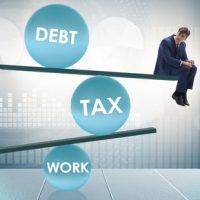Why Do People Fail to Complete a Chapter 13 Bankruptcy?

Chapter 13 has proven itself to be an attractive alternative to Chapter 7 liquidation. With a Chapter 13 bankruptcy, consumers can retain all of their non-exempt property while using disposable income to pay off a portion of their unsecured debt over the course of a few years. At the end of the repayment period, left-over unsecured debts are wiped out and the consumer can move on with their life.
However, not everyone can stick to a Chapter 13 repayment plan. These plans last three to five years, so consumers must be disciplined. Unfortunately, experts estimate that 75-80% of applicants drop out of their Chapter 13 before ever completing the plan. This can be a disastrous choice, perhaps worse than just filing a Chapter 7 right out of the gate.
Disruptions to Income
A Chapter 13 is a “wage earners” bankruptcy that requires a stable source of income. The debtor continues to pay their bills and contributes disposable income to their unsecured creditors. However, three to five years is a long time, and people can lose jobs during that period or suffer a reduction in work hours. Unless they find something right off, many consumers find it is impossible to keep up with their repayment plans.
Other filers are self-employed. Self-employed people can certainly file for a Chapter 13, but their incomes tend to fluctuate more. Unsurprisingly, many self-employed consumers find themselves in trouble as well.
Inadequate Resources
Some people quickly file a Chapter 13 hoping to stop a home foreclosure or car repossession. Although the bankruptcy code’s automatic stay will halt all collections activity, this does not mean that you suddenly will become flush with cash. You will still need to make monthly payments on your mortgage or car loan.
In truth, many debtors do not have sufficient resources to begin with when they file for bankruptcy. They often file in a panic and without an attorney thoroughly reviewing their financial information. At Nowack & Olson, we can help you better understand whether you have the income and resources to successfully complete a Chapter 13 repayment plan. And we can help you come up with a plan that is realistic.
Sudden Illness
Illness and disability can make it difficult for someone to continue working. All income must go toward care and supporting the family. Often, this means no resources are available to make payment to creditors as part of a Chapter 13. In this situation, conversion to a Chapter 7 liquidation might make the most financial sense.
Trusted Legal Advice when You Need it the Most
The South Florida bankruptcy attorneys at Nowack & Olson believe that our clients succeed when they are well informed. To that end, we meet with each of our clients to discuss their options before filing a bankruptcy petition. If Chapter 13 is right for you, we can help. If it is not right for you, then we will identify other options.
To schedule your free, confidential case review, please reach out to us today. You can call 866-907-2970 or message us online.
Resource:
uscourts.gov/services-forms/bankruptcy/bankruptcy-basics/chapter-13-bankruptcy-basics
